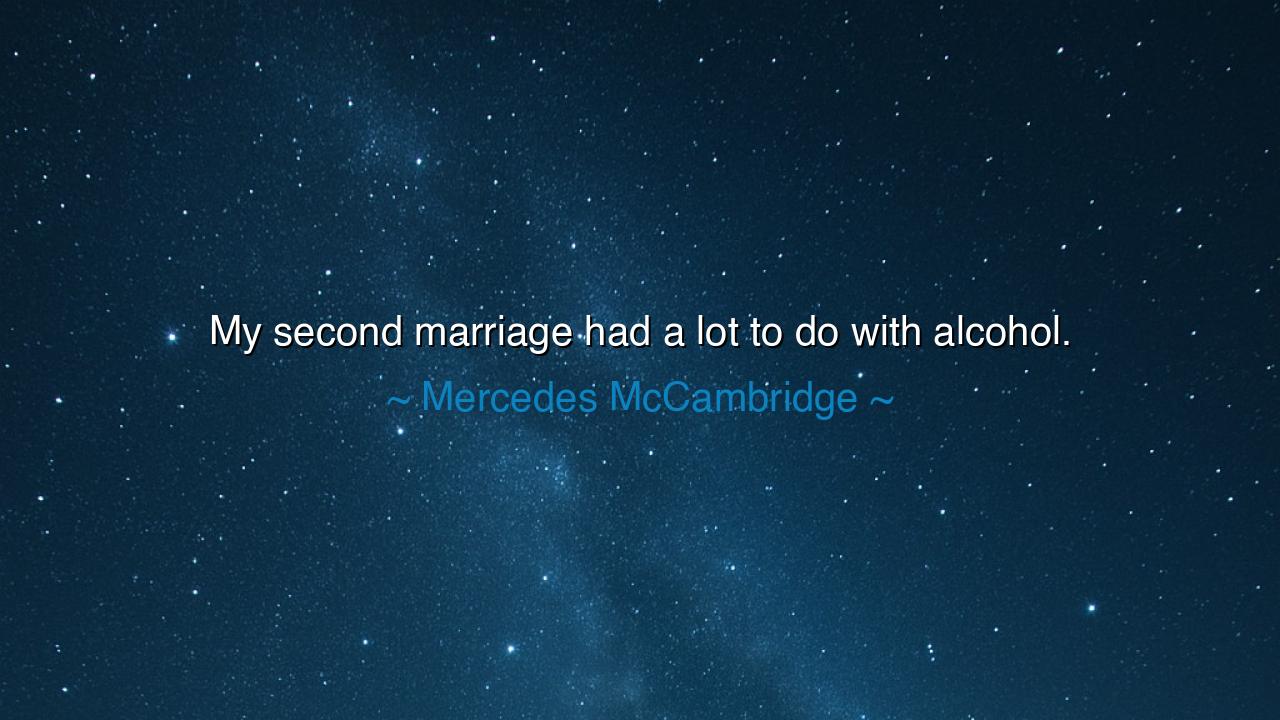
My second marriage had a lot to do with alcohol.






“My second marriage had a lot to do with alcohol.” — Thus confessed Mercedes McCambridge, a woman of great talent and turbulent soul, whose words reveal not only personal sorrow, but the eternal truth of how human frailty entwines with love. In her simple, unadorned admission lies a story that echoes through the ages — the story of passion consumed by weakness, of bonds forged and broken by the hidden storms of the heart. Her voice is not merely one of regret; it is the voice of wisdom speaking from the ashes of experience, warning future generations that even love, that most sacred fire, can be smothered by the shadows we carry within.
To grasp the meaning of her words, one must first understand that alcohol, in her time as in ours, was more than a drink — it was both escape and poison, a false comfort masking deeper pain. McCambridge, an actress of extraordinary power and emotional depth, lived much of her life under the weight of inner conflict — a spirit both creative and tormented. When she says that her marriage had a lot to do with alcohol, she speaks not merely of an indulgence, but of a destroyer. The phrase is deceptively calm, yet behind it is the devastation of trust, communication, and self-control. She exposes a universal truth: that addiction, when it enters love’s sanctuary, becomes a third presence — invisible but commanding, tender yet cruel.
The origin of this quote rests in McCambridge’s later reflections on her life — a life marked by brilliance on screen and turbulence in the soul. Known for her fierce performances and haunting voice, she wrestled with demons of dependency that shaped both her art and her relationships. Her words, then, are not accusation but acknowledgment — an offering of humility to all who would listen. They stand as a mirror to every generation, showing how even the strongest hearts can falter when pain seeks solace in intoxication. What began as comfort becomes control; what begins as a companion becomes a captor.
This truth is not hers alone. History abounds with lives undone by the bottle’s seduction. Consider the tragic tale of the writer F. Scott Fitzgerald and his wife Zelda. Their love blazed like a comet — dazzling, passionate, and doomed. Both were gifted and restless, chasing joy through the glittering chaos of the Jazz Age. Yet beneath the laughter, alcohol crept in as both muse and master. It fueled their creativity, but drained their peace. Fitzgerald once wrote, “First you take a drink, then the drink takes a drink, then the drink takes you.” Like McCambridge, he came to know that the intoxication that once seemed to liberate could, in time, enslave.
McCambridge’s words also remind us of the ancient paradox between pleasure and discipline, between human desire and the wisdom of restraint. The Greeks spoke often of this balance — how Dionysus, god of wine and ecstasy, could bring both joy and ruin. To honor him rightly was to drink deeply, but with awareness; to fall too far into indulgence was to lose oneself. In love, as in life, the same balance holds true. Passion without discipline burns itself out; comfort without courage leads to dependency. Her confession, then, is an echo of this ancient truth: when pleasure becomes escape, it ceases to nourish the soul.
Yet even in her sorrow, McCambridge’s words contain redemption. She does not speak in bitterness, but in clarity — a kind of cleansing light that follows long darkness. Her statement is short, but it carries the weight of healing. It teaches that acknowledgment is the first step toward freedom, and that truth, however painful, restores dignity. In her vulnerability, she shows strength; in her humility, she finds peace. For only when one faces the shadow can one begin again in light.
So, O listener, take heed of this lesson: beware the comforts that dull your spirit, for they may cost you what is most precious. If you love, love with sobriety — not only of body, but of heart. Let your relationships be founded not on escape, but on courage; not on illusion, but on truth. For love is a sacred fire, and every intoxicant — whether pride, despair, or the bottle’s gleam — can dim its flame. To live wisely, then, is to know your limits, to face your pain without surrendering to it, and to cherish those who walk beside you with eyes unclouded and hearts awake.
Thus, in the quiet sorrow of Mercedes McCambridge’s words lies an immortal teaching: that every fall holds the seed of wisdom, and every confession, the promise of renewal. Though her marriage may have been scarred by alcohol, her honesty redeems it. She speaks for all who have stumbled, yet still strive to stand again. And her message endures: that true love — for oneself and for others — begins not in escape, but in courage, truth, and the long, steady climb toward wholeness.






AAdministratorAdministrator
Welcome, honored guests. Please leave a comment, we will respond soon